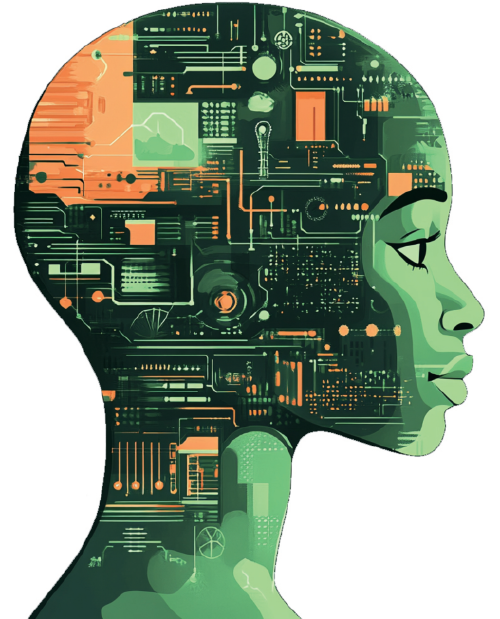Crucial driver of continent's modernization


Africa's young population and vast market potential, combined with China's technological strengths, create strong complementarities for AI cooperation
In recent years, rapid advancements in artificial intelligence have fueled a new wave of technological revolution and industrial transformation, presenting significant opportunities for Africa's development and China-Africa cooperation. As Africa's largest trading partner, China is actively expanding AI-driven innovation collaborations with African countries, which is crucial for fostering economic growth and sustainable development across the continent.
In August 2024, the African Union released the Continental Artificial Intelligence Strategy, focusing on AI development in governance, skills, research and infrastructure. Several African countries, including Mauritius, Kenya, Egypt, Algeria and Benin, have introduced national AI strategies and policies to drive technological progress.
Leveraging platforms such as the Belt and Road Initiative and the Forum on China-Africa Cooperation have helped in intensifying China-Africa exchanges in emerging technologies, new energy and advanced industries. China-Africa AI cooperation, in particular, is gaining momentum, characterized by improved institutional mechanisms, expanding collaboration fields and strengthening participation in global AI governance.
In September, President Xi Jinping delivered a keynote address at the opening ceremony of the 2024 FOCAC summit in Beijing, announcing 10 partnership action plans to deepen China-Africa cooperation. These actions explicitly call for the joint establishment of a China-Africa digital technology cooperation center and the implementation of 20 digital infrastructure and digital transformation demonstration projects by Chinese enterprises in Africa.
Additionally, China and Africa have set up mechanisms such as the China-Africa Internet Development and Cooperation Forum and the China-Africa Digital Cooperation Forum to drive AI collaboration. In 2024, the China-Africa Internet Development and Cooperation Forum announced the creation of a China-Africa cybersecurity and informatization exchange and cooperation base, while China and 26 African countries jointly released the Forum on China-Africa Cooperation Beijing Action Plan, exploring cooperation in AI, 5G/6G, high-performance computing and quantum communication.
China-Africa AI cooperation is expanding, with a strong focus on digital infrastructure development while extending into technology R&D and innovation, industrial collaboration and talent development. Since the establishment of the FOCAC, Chinese enterprises have helped African nations add or upgrade 66,000 kilometers of transmission and distribution lines, 120 gigawatts of installed power capacity and 150,000 kilometers of backbone communication networks, providing network services to nearly 700 million user terminals. They have also built large-scale data centers and provided cloud computing services, facilitating Africa's digital transformation and AI development. AI and digital talent training are also deepening. For example, in 2021, Egypt's Ministry of Communications and Information Technology partnered with Chinese enterprises to launch the Digital Egypt Builders Initiative, offering 1,000 annual scholarships to students. Huawei has collaborated with African universities to establish Huawei academies, offering digital skills training.
China and Africa are also enhancing their cooperation in global AI governance. In 2023, China released the Global AI Governance Initiative, advocating for mutual respect and equal benefits in AI development. The AU's Continental Artificial Intelligence Strategy highlights the importance of regional and global collaboration, strengthening public-private partnerships, and enhancing Africa's international influence. In 2024, the China-Africa Internet Development and Cooperation Forum issued the Chair's Statement on China-Africa Cooperation on AI, emphasizing the need for closer coordination within multilateral frameworks such as the United Nations, to enhance the representation and voice of developing countries in AI's global development and governance.
As a strategic emerging sector, AI is a crucial driver of Africa's modernization. Africa's young population and vast AI market potential, combined with China's technological and financial strengths, create strong complementarities for China-Africa AI cooperation.
First, aligning development strategies is crucial to drive new quality productive forces. AI is unlocking new opportunities for China-Africa cooperation. Based on China's New Generation Artificial Intelligence Development Plan, which sets strategic goals for 2030, China and Africa should align their AI cooperation with the AU's Continental AI Strategy and national AI strategies across African countries. Given the varying stages of AI development across Africa, priority should be given to partnerships with South Africa, Egypt, Nigeria and Rwanda, leveraging collaborations with these regional leaders to extend AI benefits to more subregional economies.
Second, enhancing technical support and improving the integration of industry, academia and research. China and Africa can explore driving bilateral efforts through technological leadership and application, strengthening technological independence and industrial progress, and enhancing economic innovation and international competitiveness. The two sides can build the China-Africa digital technology cooperation center, strengthen fundamental research on general AI and key technology development, carry out joint research actively, experience sharing and technical exchanges, and explore innovations in critical core technologies.
In terms of technological application, China and Africa can deepen cooperation based on Africa's concerns and needs. For example, 49 percent of AI applications in Africa focus on agriculture, and 26 percent on climate actions. Therefore, China and Africa should focus on application-oriented and problem-oriented approaches, addressing Africa's practical development challenges. Also, in terms of talent development, they can improve the China-Africa science and education cooperation mechanism by implementing "AI plus education", "AI plus healthcare "and other projects to empower people's livelihoods.
Last, building consensus on AI governance is necessary to strengthen the influence of the Global South. The rise of general AI models has introduced ethical, security and governance challenges, making AI regulation a shared global concern. The United States, the United Kingdom and other Western powers are actively shaping AI standards and governance rules to maintain dominance. As members of the Global South, China and African nations should collaborate through various multilateral platforms to enhance the voice of developing countries in global AI governance.
The author is chair of the Institute Affairs Committee and vice-president of the Institute of African Studies at Zhejiang Normal University. The author contributed this article to China Watch, a think tank powered by China Daily.
The views do not necessarily reflect those of China Daily.
Contact the editor at editor@chinawatch.cn.


































